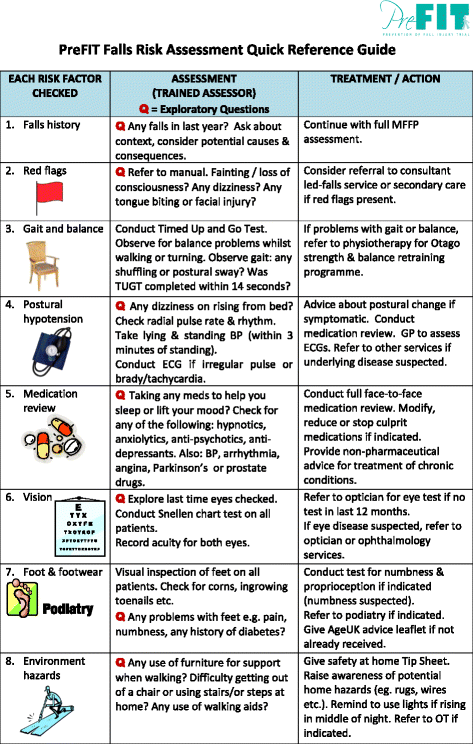Dementia Fall Risk - Questions
Dementia Fall Risk - Questions
Blog Article
Get This Report on Dementia Fall Risk
Table of Contents8 Simple Techniques For Dementia Fall RiskSee This Report on Dementia Fall RiskThe Greatest Guide To Dementia Fall RiskUnknown Facts About Dementia Fall RiskWhat Does Dementia Fall Risk Mean?
You might be anxious because you've had an autumn prior to or due to the fact that you have actually noticed you're beginning to feel unstable on your feet. You might have observed adjustments to your health and wellness, or just seem like you're slowing down a little. Whatever the factor, it isn't unusual to end up being cautious and shed confidence, and this can stop you doing the important things you used to do and make you really feel much more separated.If you have actually had a loss or you have actually begun to feel unsteady, tell your doctor even if you really feel fine or else. Your doctor can check your equilibrium and the means you stroll to see if improvements can be made. They may be able to refer you for a drops threat evaluation or to the falls avoidance solution.
This details can be obtained with meetings with the person, their caregivers, and a testimonial of their clinical records. Begin by asking the specific regarding their history of drops, including the frequency and circumstances of any kind of current falls. Dementia Fall Risk. Inquire regarding any type of wheelchair issues they may experience, such as unsteady or trouble walking
Conduct a thorough testimonial of the individual's medications, paying particular attention to those known to boost the risk of falls, such as sedatives or medications that reduced blood pressure. Determine if they are taking several medications or if there have actually been recent modifications in their medication program. Evaluate the person's home environment for prospective hazards that can boost the risk of drops, such as poor lighting, loosened carpets, or absence of grab bars in the shower room.
The Ultimate Guide To Dementia Fall Risk
Guide the individual via the loss risk evaluation kind, discussing each concern and videotaping their responses properly. Make sure that the private recognizes the purpose of the evaluation and really feels comfy offering honest solutions. Calculate the total risk score based upon the responses offered in the assessment form. Figure out the person's danger classification (low, tool, or high) based on the total rating and the visibility of automated risky status factors.
Routinely keep track of the individual's progression and reassess their danger of drops as needed. Provide continuous education and assistance to promote safety and reduce the risk of drops in their day-to-day living activities.
Several studies have shown that physical therapy can help to reduce the risk of dropping in grownups ages 65 and older. In a brand-new study (that took a look at drops danger in women ages 80 and older), researchers computed the economic effect of picking physical therapy to prevent drops, and they located that doing so saves $2,144, including all the covert costs of visit your time, pain, missed out on life occasions, and the bucks spent for services.
What Does Dementia Fall Risk Mean?
Analyzing your equilibrium, toughness, and strolling ability. A home safety evaluation. Based on the analysis results, your physical therapist will develop a plan that is tailored to your specific demands.
Older adults who have difficulty strolling and chatting at the very same time go to a higher risk of falling. Dementia Fall Risk. To help increase your security throughout daily activities, your physical therapist might make a training program that will certainly test you to preserve standing and strolling while you do one more task. Examples include walking or standing while counting backwards, having a discussion, or carrying a bag of groceries
Your physical specialist additionally can identify which activities you must stay clear of to remain secure. Community-based falls prevention programs assist individuals to: Decrease their concern of dropping. Set objectives for increasing their physical task. Make their homes much safer. Work out extra to enhance their toughness and balance. These programs usually are led by volunteer trains.
Dementia Fall Risk Things To Know Before You Buy

Measles, or rubeola, is a highly transmittable, severe viral transmittable disease triggered by the measles infection. Some individuals consider measles as just a breakout and high temperature click this link that cleans up in a few days; nonetheless, measles can cause severe wellness issues, specifically in kids more youthful than 5-years-old. The most effective security versus measles is the measles, mumps, and rubella (MMR) vaccine.
Falls are a typical reason of injury amongst older grownups.
The 30-Second Trick For Dementia Fall Risk

She has no background of drops, her gait is constant, and she invalidates with no concerns. The previous registered nurse states that she calls for help to the shower room when she needs to go.
Instances of usual fall interventions/measures consist of: Guaranteeing a patient's crucial products are within reach. Putting the client's bed rails up with the alarm system on. Helping a patient while they're standing up from best site bed. Beyond understanding just how to make use of the Johns Hopkins Autumn Threat Evaluation Device, it is very important that centers integrate its usage into an extra extensive loss avoidance plan.
Report this page